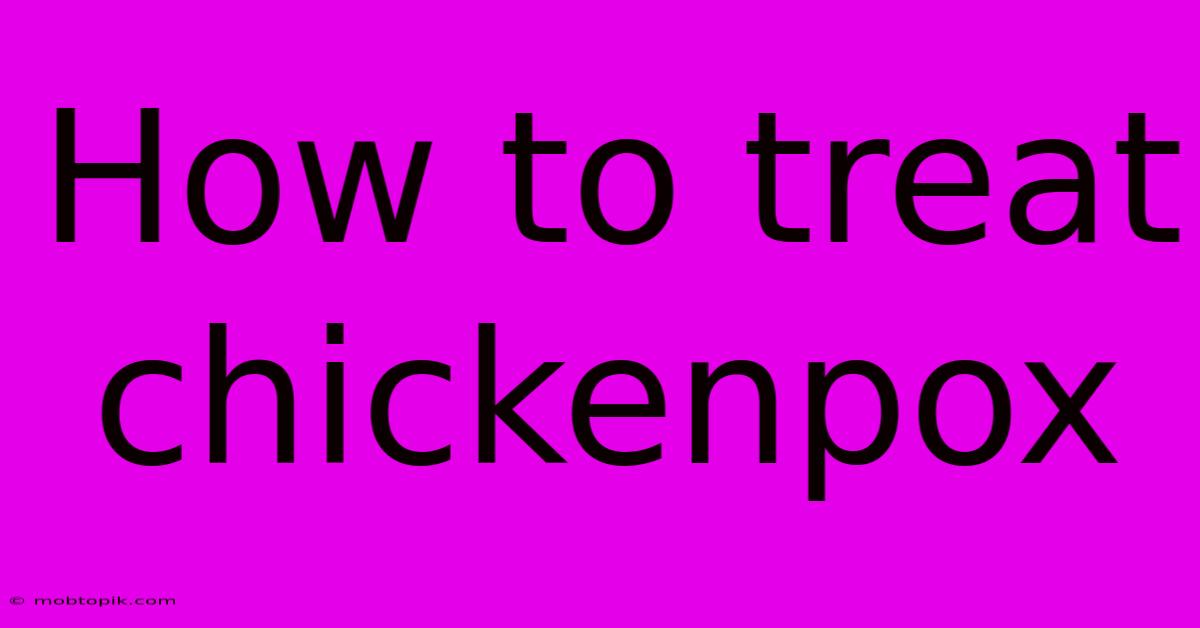How To Treat Chickenpox

Discover more detailed and exciting information on our website. Click the link below to start your adventure: Visit Best Website mobtopik.com. Don't miss out!
Table of Contents
How to Treat Chickenpox: A Comprehensive Guide
Chickenpox, also known as varicella, is a highly contagious disease caused by the varicella-zoster virus (VZV). Characterized by an itchy, blister-like rash, it's most common in children but can affect people of any age. While generally mild, chickenpox can be serious in certain individuals, highlighting the importance of proper treatment and management. This comprehensive guide explores various aspects of chickenpox treatment, from home remedies to medical interventions.
Understanding Chickenpox: Symptoms and Complications
Before delving into treatment, it's crucial to understand the typical progression of chickenpox. The illness usually begins with mild symptoms like fever, headache, fatigue, and loss of appetite. These are often followed by the characteristic rash, which starts as small, red bumps that quickly evolve into fluid-filled blisters. These blisters eventually crust over, eventually scabbing and falling off. The rash typically appears on the face, scalp, chest, back, and limbs.
While most cases are mild and resolve within a few weeks, complications can arise. These complications are more common in adults, infants, pregnant women, and individuals with weakened immune systems. Serious complications can include:
- Bacterial skin infections: Scratching the blisters can lead to secondary bacterial infections.
- Pneumonia: In rare cases, the virus can infect the lungs.
- Encephalitis: This rare but serious complication involves inflammation of the brain.
- Reye's syndrome: This rare but potentially fatal condition can occur in children treated with aspirin. Never give aspirin to a child with chickenpox.
- Disseminated infection: In immunocompromised individuals, the virus can spread throughout the body.
Recognizing these potential complications underscores the need for prompt medical attention if symptoms worsen or if any concerning signs develop.
Treating Chickenpox at Home: Comfort Measures and Relief
For most individuals, chickenpox treatment focuses on managing symptoms and preventing complications. Several home remedies can provide relief:
1. Keeping Cool and Comfortable:
- Cool baths or showers: These can help soothe the itchy rash. Avoid using harsh soaps or scrubbing the affected areas.
- Loose, comfortable clothing: This prevents irritation from clothing rubbing against the blisters. Cotton clothing is preferred.
- Cool compresses: Applying cool, wet cloths to itchy areas can provide temporary relief.
- Clipping fingernails: Keeping fingernails short will help prevent scratching and potential secondary infections.
- Avoiding scratching: This is crucial to prevent scarring and secondary bacterial infections. Consider using mittens or socks on hands, especially for children, to prevent scratching during sleep.
2. Over-the-Counter Medications:
- Antihistamines: These medications can help reduce itching. Diphenhydramine (Benadryl) and cetirizine (Zyrtec) are commonly used options. Always follow the recommended dosage.
- Pain relievers: Acetaminophen (Tylenol) can help reduce fever and pain. Never give aspirin to a child or teenager with chickenpox due to the risk of Reye's syndrome.
3. Maintaining Hydration and Nutrition:
- Plenty of fluids: Staying well-hydrated is essential, especially if there's a fever. Encourage consumption of water, clear broths, and electrolyte drinks.
- Nutritious diet: A balanced diet helps support the body's immune response.
When to Seek Medical Attention:
While home treatment is often sufficient, certain situations necessitate a visit to a doctor:
- Severe symptoms: High fever, severe headache, difficulty breathing, or signs of dehydration require immediate medical attention.
- Widespread rash: If the rash is extensive or accompanied by significant discomfort, medical advice is necessary.
- Secondary infection: Signs of a bacterial skin infection, such as increased pain, redness, swelling, or pus, require prompt medical treatment with antibiotics.
- Complication concerns: Any signs of complications, such as encephalitis or pneumonia, require immediate medical care.
- Immunocompromised individuals: People with weakened immune systems should be monitored closely, as they are at higher risk of complications.
- Pregnant women: Chickenpox during pregnancy can be dangerous to both the mother and the fetus; immediate medical attention is crucial.
Medical Treatments for Chickenpox:
In certain cases, a doctor may prescribe medications to treat chickenpox:
- Antiviral medications: These medications, such as acyclovir, may be prescribed to reduce the severity and duration of the illness, particularly in high-risk individuals. They are most effective when started early in the course of the illness.
- Antibiotics: These are used to treat secondary bacterial skin infections.
- Intravenous fluids: These may be necessary in cases of severe dehydration.
Preventing Chickenpox: Vaccination
The most effective way to prevent chickenpox is through vaccination. The varicella vaccine is highly effective and is routinely recommended for children. Adults who haven't had chickenpox or haven't been vaccinated should also consider getting vaccinated. The vaccine significantly reduces the risk of developing chickenpox and its complications.
Conclusion: Managing Chickenpox Effectively
Chickenpox is a common childhood illness, but understanding its symptoms, potential complications, and appropriate treatment strategies is crucial. While most cases resolve with home management focusing on comfort measures and symptom relief, seeking medical attention when necessary is paramount. Vaccination remains the best way to prevent this contagious disease. Remember to always consult with a healthcare professional for accurate diagnosis and personalized treatment plans. Don't hesitate to reach out if you have any concerns about chickenpox. Early intervention and appropriate care can significantly improve outcomes and prevent serious complications.

Thank you for visiting our website wich cover about How To Treat Chickenpox. We hope the information provided has been useful to you. Feel free to contact us if you have any questions or need further assistance. See you next time and dont miss to bookmark.
Also read the following articles
| Article Title | Date |
|---|---|
| How To Treat Cuts | Nov 29, 2024 |
| How To Treat Obesity | Nov 29, 2024 |
| Rangers In Ezici Galibiyeti Nice 1 4 | Nov 29, 2024 |
| How To Treat Panic Attacks | Nov 29, 2024 |
| How To Treat Fungal Infections | Nov 29, 2024 |
